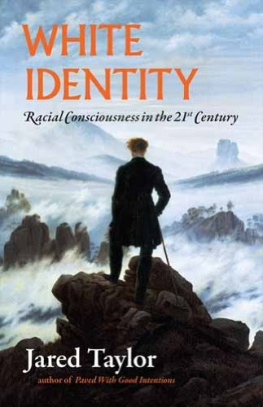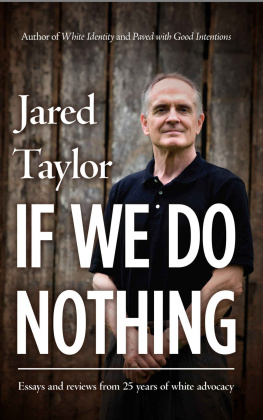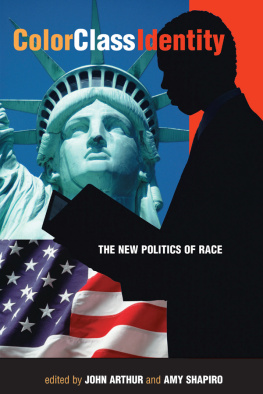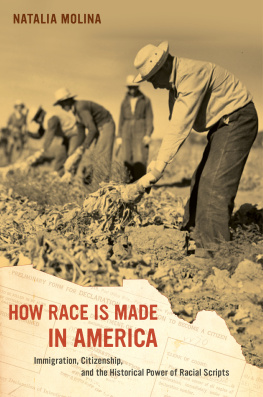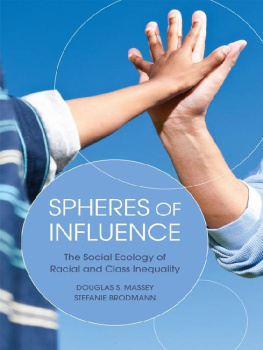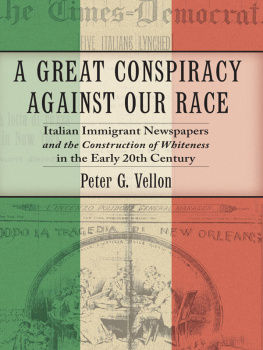Jared Taylor - White Identity: Racial Consciousness in the 21st Century
Here you can read online Jared Taylor - White Identity: Racial Consciousness in the 21st Century full text of the book (entire story) in english for free. Download pdf and epub, get meaning, cover and reviews about this ebook. City: Oakton, Va., United States, year: 2011, publisher: New Century Books, genre: Politics. Description of the work, (preface) as well as reviews are available. Best literature library LitArk.com created for fans of good reading and offers a wide selection of genres:
Romance novel
Science fiction
Adventure
Detective
Science
History
Home and family
Prose
Art
Politics
Computer
Non-fiction
Religion
Business
Children
Humor
Choose a favorite category and find really read worthwhile books. Enjoy immersion in the world of imagination, feel the emotions of the characters or learn something new for yourself, make an fascinating discovery.
- Book:White Identity: Racial Consciousness in the 21st Century
- Author:
- Publisher:New Century Books
- Genre:
- Year:2011
- City:Oakton, Va., United States
- Rating:5 / 5
- Favourites:Add to favourites
- Your mark:
White Identity: Racial Consciousness in the 21st Century: summary, description and annotation
We offer to read an annotation, description, summary or preface (depends on what the author of the book "White Identity: Racial Consciousness in the 21st Century" wrote himself). If you haven't found the necessary information about the book — write in the comments, we will try to find it.
Ten years in the making, this book is the sequel to Jared Taylors seminal Paved With Good Intentions. In White Identity, Taylor systematically marshals the data to show that:
-People of all races pay lip service to the ideal of integration but generally prefer to remain apart.
-Study after scientific study suggests that racial identity is an inherent part of human nature.
-Diversity of race, language, religion, etc. is not a strength for America but a source of chronic tension and conflict.
-Non-whites--especially blacks and Hispanics but now even Asians--openly take pride in their race and put group interests ahead of those of the country as a whole.
-Only whites continue to believe that it is possible or even desirable to transcend race and try to make the United States a nation in which race does not matter.
Taylor argues that America must reassess dated assumptions, and that we need policies based on a realistic understanding of race, not on fantasies.
Most provocatively, Taylor argues that whites must exercise the same rights as other groups--that they must be unafraid of considering their own legitimate interests. He concludes by warning whites that if they do not defend their interests they will be marginalized by groups that do not hesitate to assert themselves, numerically and culturally.
The culmination of 25 years of writing about race, immigration, and Americas future, this is Jared Taylors best and most complete statement of why it is vitally important for whites to defend their legitimate group interests.
ReviewJared Taylor is arguably the most brilliant of the leaders of what is sometimes called the Alternative Right, the intellectual movement focused on emergent issues that are now systematically suppressed in Americas purblind public debate. This book, the long awaited sequel to his seminal Paved With Good Intentions, will eventually be seen as a decisive step forward on the historic American nations road to recovery from the paralyzing curse of Political Correctness.
-- Peter Brimelow, Editor of VDARE.com and author of Alien Nation: Common Sense About Americas Immigration Disaster
In this brilliant and wide-ranging survey of the relevant science and history, Jared Taylor shows that racial consciousness is intrinsic and that efforts to remake human nature are doomed to fail. He shows that in modern America, people of all races prefer the company of people of their own race; that racial diversity is more often a source of conflict than of strength; and that multiculturalism is changing the United States profoundly and to the detriment of most white people.
-- Dr. Raymond Wolters, Keith Professor of History, University of Delaware
The work of an insightful, well-tempered, and above all, demandingly honest mind, White Identity is especially timely as the white population of America comes under intensifying demographic, political, cultural, and economic pressure from both within and without. Jared Taylor deserves our deep gratitude for declaring that whites must find a way to stand up for themselves in a world in which they are becoming a shrinking minority, even in their own once white-majority countries.
-- Prof. J. Philippe Rushton, Department of Psychology, University of Western Ontario
Jared Taylor offers the reader an open, honest, and frank discussion of the reality of race and race relations in America today. He convincingly argues that unless all the facts, painful or politically inconvenient though they may be, are laid bare then all that follows will be based on false assumptions and doomed to failure.
-- Dr. Roger D. McGrath, Author/Historian/Television Commentator
White Identity makes shocking and painful reading for any white person who fears for the future of the United States. It is about the relentless demise of whites, about the loss of will to survive, even about the death of whites globally. As Jared Taylor demonstrates in a relentless barrage of data and statistics, whites are being racially, culturally and physically dispossessed by non-whites. The acceptance of multiculturalism as something beneficial when it is barely concealed and often explicit anti-white racism renders whites uniquely vulnerable to the organized racial solidarity of non-whites. I retain hope. I retain this hope because of the author himself. Jared Taylor embodies all the virtues that made the American Republic: physical courage, wisdom, love of learning, an indomitable spirit and point-blank refusal to live by the Lie.
-- Dr. Frank Ellis, formerly of University of Nevada, Las Vegas and University of Leeds
Jared Taylor documents the dire consequences of demographic change in the United States. He warns of the deterioration that will follow when and if whites become a minority, and sounds a much needed wake-up call for whites to regain their sense of racial consciousness.
-- Dr. Richard Lynn, Professor emeritus of psychology, University of Ulster
If you dont like letting facts ruin your fantasies about race relations and diversity stay away from this book!
--Dr. Anthony Hilton, Associate Professor of Psychology (retired), Concordia University, Montreal
Fear of an Erudite White
By Jim Goad
White Identity is Jared Taylors first full-l --Houston Conservative Examiner
Few men in America are as reviled by the liberal establishment as Jared Taylor, editor of American Renaissance. According to the Southern Poverty Law Center (SPLC), he is a courtly presenter of ideas that most would consider crudely white supremacist. Keep in mind that the SPLC is an organization that cites Thomas Fleming, editor of this magazine, 11 times on its website for his association with such hate groups as the League of the South and the notorious Rockford Institute. If you are reading this madazine, you are already tainted. If you buy Jared Taylors new book, you probably risk investigation by the ATF or some clandestine civil-rights-enforcement organization. Even reading this review could endanger your voting rights in the New World Order.
Now that you have been forewarned, allow me to summarize Taylors argument: The architects of the civil-rights movement, who sought to build a color-blind, fully integrated society, have achieved only a pyrrhic victory. If minorities are well represented in our public institutions, our schools and colleges, our sports, and in the media, pervasive segregation persists in virtually every form of volutnary association. The Ideology of multiculturalsim, while it celebrates diversity, is little more than a cover for a divisive racial poer politics intended to demonize whites and impose upon them a disabling burden of guilt and self-loathing. While blacks, Hispanic, Asians, and other minorities are encouraged to express racial solidarity, whites who attempt to do the same are branded as racists covertly seeking to restore white supremacy. Unchecked immigration across the Mexican-American border is permanently altering not only the complexion but the character of American life. By mid-century, America will be a mosaic of minority cultures, each competing fiercely for its share of power and federal largesse. Given this reality, whites can no longer afford the luxury of disdain for racial-identity politics. Whites today, Taylor writes, have a choice: regain a sense of identity and the resolve to maintain their numbers, their traditions, and their way of life--or face oblivion.
Taylor is among the few who have taken an unflinching look at the reality of racial segregation in contemporary American life. While in the past it was almost universally assumed that segregation was a direct consequence of white discrimination and everything to do with ethnic preference and political advantage. Many blacks now see the integrationist ideal as merely a political tool that has served its purpose. As Leon Williams wrote in a letter to the editor published in 2004 by the *Philadelphia Inquirer,* there is nothing wrong with segregation. Most African Americans with good sense want the same relations that most whites want. We dont want them living in our neighborhoods. We dont want our children going to school with theirs. . . We dont need tea and cookies and fireside chats with white people.Taylor makes a strong case that such attitudes, while not universal among blacks, are widespread. Education has, of course, been among the most hotly contested terrains in the struggle for equal opportunity. Blacks were once fervent supporters of public-school integration, but today many leaders in the black community are profoundly disillusioned with the official integrationist position of NAACP and have become advocates of segregated education, especially charter schools designed to serve black children.
--Jack Trotter, Chronicles August 2011
White Identity: Racial Consciousness in the 21st Century, by Jared Taylor
By Brett Stevens
People dont like to talk about it these days, but a big part of conservatism is racial identity what was once called nationalism, when nation meant the ethnicity in which you were born.
Jared Taylor, a Yale graduate and independent businessman, has for the last two decades run an organization called American Renaissance that addresses the national question. Namely: how do we get beyond diversity, which doesnt work for anyone, and re-discover our nationalist roots?
Naturally this upsets leftists. They claim to be tolerant of everything, but anything they dont like they accuse of being either elitist, racist, sexist, homophobic, anti-fat, Social Darwinism, Satan, etc. Leftists want you to think that you either think multiculturalism is Double Plus Good, or youre a fascist. No middle ground!
Taylors newest book, White Identity: Racial Consciousness in the 21st Century, will dispel these spurious claims because it does not just focus on white identity. Rather, it explores nationalist and identitarian politics and viewpoints in four racial groups: African-Americans, Asians, Hispanics and whites.
Through meticulously researched content, Taylor proves that (a) diversity is failing despite massive government efforts (b) each racial or ethnic group seeks its own self-rule and identity, and in fact most prefer segregation (c) that racial identity is healthy for members of all ethnic groups and (d) that diversity and multiculturalism not only are failing now, but portend a future of continued failure that will harm all ethnic groups.
Sleek but not slick prose flows through this readable and engaging text, using numerous examples from both scientific publications and the mainstream news. Arguments are cleanly constructed and stand alone. It is an impressive work that will bring food for thought to anyone brave enough to consider the analysis it offers.
If you want a respite from the dogmatic race-baiting of mainstream politics, and a more scientific and historical viewpoint that is both balanced and compassionate but also logical and focused on the long term, White Identity: Racial Consciousness in the 21st Century by Jared Taylor is an enjoyable and informative read. --Houston Conservative Examiner
About the AuthorJared Taylor was born in Japan, where he lived until he was 16 years old. He has a bachelors degree in philosophy from Yale University and a masters degree in international economics from lInstitut dEtudes Politiques de Paris.
He has worked as an international lending office for a major New York bank and as a consultant to companies doing business in Japan. For three yeas he was the West Coast Editor of PC (Personal Computing) Magazine, and has published articles and essays in the following publications:
Wall Street Journal, Los Angeles Times, Chicago Tribune, Baltimore Sun, Washington Star, San Francisco Chronicle, Boston Globe, National Review, Chronicles.
Since 1994, Jared Taylor has been the president of New Century Foundation, which publishes American Renaissance, a monthly magazine devoted to issues of race and immigration.
He is the author of the following books:
Shadows of the Rising Sun: A Critical View of the Japanese Miracle, 1983, 336 pp., William Morrow & Co.
Paved With Good Intensions: The Failure of Race Relations in Contemporary America, 1992, 416 pp., Carol and Graf (now part of Avalon Publishing).
The Tyranny of the New and Other Essays, 1992, Kinseido Publishers (Tokyo), 89 pp.
Jared Taylor lives with his family in the northern Virginia suburbs of Washington, DC.
Jared Taylor: author's other books
Who wrote White Identity: Racial Consciousness in the 21st Century? Find out the surname, the name of the author of the book and a list of all author's works by series.

